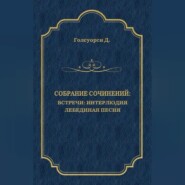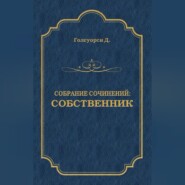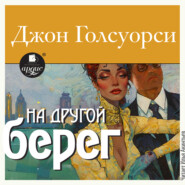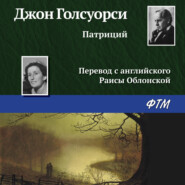По всем вопросам обращайтесь на: info@litportal.ru
(©) 2003-2024.
✖
Plays : Second Series
Настройки чтения
Размер шрифта
Высота строк
Поля
FOREMAN. Guilty.
The JUDGE nods; then, gathering up his notes, sits looking at FALDER, who stands motionless.
FROME. [Rising] If your lordship would allow me to address you in mitigation of sentence. I don't know if your lordship thinks I can add anything to what I have said to the jury on the score of the prisoner's youth, and the great stress under which he acted.
THE JUDGE. I don't think you can, Mr. Frome.
FROME. If your lordship says so—I do most earnestly beg your lordship to give the utmost weight to my plea. [He sits down.]
THE JUDGE. [To the CLERK] Call upon him.
THE CLERK. Prisoner at the bar, you stand convicted of felony. Have you anything to say for yourself, why the Court should not give you judgment according to law? [FALDER shakes his head]
THE JUDGE. William Falder, you have been given fair trial and found guilty, in my opinion rightly found guilty, of forgery. [He pauses; then, consulting his notes, goes on] The defence was set up that you were not responsible for your actions at the moment of committing this crime. There is no, doubt, I think, that this was a device to bring out at first hand the nature of the temptation to which you succumbed. For throughout the trial your counsel was in reality making an appeal for mercy. The setting up of this defence of course enabled him to put in some evidence that might weigh in that direction. Whether he was well advised to so is another matter. He claimed that you should be treated rather as a patient than as a criminal. And this plea of his, which in the end amounted to a passionate appeal, he based in effect on an indictment of the march of Justice, which he practically accused of confirming and completing the process of criminality. Now, in considering how far I should allow weight to his appeal; I have a number of factors to take into account. I have to consider on the one hand the grave nature of your offence, the deliberate way in which you subsequently altered the counterfoil, the danger you caused to an innocent man—and that, to my mind, is a very grave point—and finally I have to consider the necessity of deterring others from following your example. On the other hand, I have to bear in mind that you are young, that you have hitherto borne a good character, that you were, if I am to believe your evidence and that of your witnesses, in a state of some emotional excitement when you committed this crime. I have every wish, consistently with my duty—not only to you, but to the community—to treat you with leniency. And this brings me to what are the determining factors in my mind in my consideration of your case. You are a clerk in a lawyer's office—that is a very serious element in this case; there can be no possible excuse made for you on the ground that you were not fully conversant with the nature of the crime you were committing, and the penalties that attach to it. It is said, however, that you were carried away by your emotions. The story has been told here to-day of your relations with this—er—Mrs. Honeywill; on that story both the defence and the plea for mercy were in effect based. Now what is that story? It is that you, a young man, and she, a young woman, unhappily married, had formed an attachment, which you both say—with what truth I am unable to gauge —had not yet resulted in immoral relations, but which you both admit was about to result in such relationship. Your counsel has made an attempt to palliate this, on the ground that the woman is in what he describes, I think, as "a hopeless position." As to that I can express no opinion. She is a married woman, and the fact is patent that you committed this crime with the view of furthering an immoral design. Now, however I might wish, I am not able to justify to my conscience a plea for mercy which has a basis inimical to morality. It is vitiated 'ab initio', and would, if successful, free you for the completion of this immoral project. Your counsel has made an attempt to trace your offence back to what he seems to suggest is a defect in the marriage law; he has made an attempt also to show that to punish you with further imprisonment would be unjust. I do not follow him in these flights. The Law is what it is—a majestic edifice, sheltering all of us, each stone of which rests on another. I am concerned only with its administration. The crime you have committed is a very serious one. I cannot feel it in accordance with my duty to Society to exercise the powers I have in your favour. You will go to penal servitude for three years.
FALDER, who throughout the JUDGE'S speech has looked at him steadily, lets his head fall forward on his breast. RUTH starts up from her seat as he is taken out by the warders. There is a bustle in court.
THE JUDGE. [Speaking to the reporters] Gentlemen of the Press, I think that the name of the female witness should not be reported.
The reporters bow their acquiescence. THE JUDGE. [To RUTH, who is staring in the direction in which FALDER has disappeared] Do you understand, your name will not be mentioned?
COKESON. [Pulling her sleeve] The judge is speaking to you.
RUTH turns, stares at the JUDGE, and turns away.
THE JUDGE. I shall sit rather late to-day. Call the next case.
CLERK of ASSIZE. [To a warder] Put up John Booley.
To cries of "Witnesses in the case of Booley":
The curtain falls.
ACT III
SCENE I
A prison. A plainly furnished room, with two large barred windows, overlooking the prisoners' exercise yard, where men, in yellow clothes marked with arrows, and yellow brimless caps, are seen in single file at a distance of four yards from each other, walking rapidly on serpentine white lines marked on the concrete floor of the yard. Two warders in blue uniforms, with peaked caps and swords, are stationed amongst them. The room has distempered walls, a bookcase with numerous official-looking books, a cupboard between the windows, a plan of the prison on the wall, a writing-table covered with documents. It is Christmas Eve.
The GOVERNOR, a neat, grave-looking man, with a trim, fair moustache, the eyes of a theorist, and grizzled hair, receding from the temples, is standing close to this writing-table looking at a sort of rough saw made out of a piece of metal. The hand in which he holds it is gloved, for two fingers are missing. The chief warder, WOODER, a tall, thin, military-looking man of sixty, with grey moustache and melancholy, monkey-like eyes, stands very upright two paces from him.
THE GOVERNOR. [With a faint, abstracted smile] Queer-looking affair, Mr. Wooder! Where did you find it?
WOODER. In his mattress, sir. Haven't come across such a thing for two years now.
THE GOVERNOR. [With curiosity] Had he any set plan?
WOODER. He'd sawed his window-bar about that much. [He holds up his thumb and finger a quarter of an inch apart]
THE GOVERNOR. I'll see him this afternoon. What's his name? Moaney! An old hand, I think?
WOODER. Yes, sir-fourth spell of penal. You'd think an old lag like him would have had more sense by now. [With pitying contempt] Occupied his mind, he said. Breaking in and breaking out—that's all they think about.
THE GOVERNOR. Who's next him?
WOODER. O'Cleary, sir.
THE GOVERNOR. The Irishman.
WOODER. Next him again there's that young fellow, Falder—star class—and next him old Clipton.
THE GOVERNOR. Ah, yes! "The philosopher." I want to see him about his eyes.
WOODER. Curious thing, sir: they seem to know when there's one of these tries at escape going on. It makes them restive—there's a regular wave going through them just now.
THE GOVERNOR. [Meditatively] Odd things—those waves. [Turning to look at the prisoners exercising] Seem quiet enough out here!
WOODER. That Irishman, O'Cleary, began banging on his door this morning. Little thing like that's quite enough to upset the whole lot. They're just like dumb animals at times.
THE GOVERNOR. I've seen it with horses before thunder—it'll run right through cavalry lines.
The prison CHAPLAIN has entered. He is a dark-haired, ascetic man, in clerical undress, with a peculiarly steady, tight-lipped face and slow, cultured speech.
THE GOVERNOR. [Holding up the saw] Seen this, Miller?
THE CHAPLAIN. Useful-looking specimen.
THE GOVERNOR. Do for the Museum, eh! [He goes to the cupboard and opens it, displaying to view a number of quaint ropes, hooks, and metal tools with labels tied on them] That'll do, thanks, Mr. Wooder.
WOODER. [Saluting] Thank you, sir. [He goes out]
THE GOVERNOR. Account for the state of the men last day or two, Miller? Seems going through the whole place.
THE CHAPLAIN. No. I don't know of anything.
THE GOVERNOR. By the way, will you dine with us on Christmas Day?
THE CHAPLAIN. To-morrow. Thanks very much.
THE GOVERNOR. Worries me to feel the men discontented. [Gazing at the saw] Have to punish this poor devil. Can't help liking a man who tries to escape. [He places the saw in his pocket and locks the cupboard again]
THE CHAPLAIN. Extraordinary perverted will-power—some of them. Nothing to be done till it's broken.
THE GOVERNOR. And not much afterwards, I'm afraid. Ground too hard for golf?
WOODER comes in again.
WOODER. Visitor who's been seeing Q 3007 asks to speak to you, sir. I told him it wasn't usual.
The JUDGE nods; then, gathering up his notes, sits looking at FALDER, who stands motionless.
FROME. [Rising] If your lordship would allow me to address you in mitigation of sentence. I don't know if your lordship thinks I can add anything to what I have said to the jury on the score of the prisoner's youth, and the great stress under which he acted.
THE JUDGE. I don't think you can, Mr. Frome.
FROME. If your lordship says so—I do most earnestly beg your lordship to give the utmost weight to my plea. [He sits down.]
THE JUDGE. [To the CLERK] Call upon him.
THE CLERK. Prisoner at the bar, you stand convicted of felony. Have you anything to say for yourself, why the Court should not give you judgment according to law? [FALDER shakes his head]
THE JUDGE. William Falder, you have been given fair trial and found guilty, in my opinion rightly found guilty, of forgery. [He pauses; then, consulting his notes, goes on] The defence was set up that you were not responsible for your actions at the moment of committing this crime. There is no, doubt, I think, that this was a device to bring out at first hand the nature of the temptation to which you succumbed. For throughout the trial your counsel was in reality making an appeal for mercy. The setting up of this defence of course enabled him to put in some evidence that might weigh in that direction. Whether he was well advised to so is another matter. He claimed that you should be treated rather as a patient than as a criminal. And this plea of his, which in the end amounted to a passionate appeal, he based in effect on an indictment of the march of Justice, which he practically accused of confirming and completing the process of criminality. Now, in considering how far I should allow weight to his appeal; I have a number of factors to take into account. I have to consider on the one hand the grave nature of your offence, the deliberate way in which you subsequently altered the counterfoil, the danger you caused to an innocent man—and that, to my mind, is a very grave point—and finally I have to consider the necessity of deterring others from following your example. On the other hand, I have to bear in mind that you are young, that you have hitherto borne a good character, that you were, if I am to believe your evidence and that of your witnesses, in a state of some emotional excitement when you committed this crime. I have every wish, consistently with my duty—not only to you, but to the community—to treat you with leniency. And this brings me to what are the determining factors in my mind in my consideration of your case. You are a clerk in a lawyer's office—that is a very serious element in this case; there can be no possible excuse made for you on the ground that you were not fully conversant with the nature of the crime you were committing, and the penalties that attach to it. It is said, however, that you were carried away by your emotions. The story has been told here to-day of your relations with this—er—Mrs. Honeywill; on that story both the defence and the plea for mercy were in effect based. Now what is that story? It is that you, a young man, and she, a young woman, unhappily married, had formed an attachment, which you both say—with what truth I am unable to gauge —had not yet resulted in immoral relations, but which you both admit was about to result in such relationship. Your counsel has made an attempt to palliate this, on the ground that the woman is in what he describes, I think, as "a hopeless position." As to that I can express no opinion. She is a married woman, and the fact is patent that you committed this crime with the view of furthering an immoral design. Now, however I might wish, I am not able to justify to my conscience a plea for mercy which has a basis inimical to morality. It is vitiated 'ab initio', and would, if successful, free you for the completion of this immoral project. Your counsel has made an attempt to trace your offence back to what he seems to suggest is a defect in the marriage law; he has made an attempt also to show that to punish you with further imprisonment would be unjust. I do not follow him in these flights. The Law is what it is—a majestic edifice, sheltering all of us, each stone of which rests on another. I am concerned only with its administration. The crime you have committed is a very serious one. I cannot feel it in accordance with my duty to Society to exercise the powers I have in your favour. You will go to penal servitude for three years.
FALDER, who throughout the JUDGE'S speech has looked at him steadily, lets his head fall forward on his breast. RUTH starts up from her seat as he is taken out by the warders. There is a bustle in court.
THE JUDGE. [Speaking to the reporters] Gentlemen of the Press, I think that the name of the female witness should not be reported.
The reporters bow their acquiescence. THE JUDGE. [To RUTH, who is staring in the direction in which FALDER has disappeared] Do you understand, your name will not be mentioned?
COKESON. [Pulling her sleeve] The judge is speaking to you.
RUTH turns, stares at the JUDGE, and turns away.
THE JUDGE. I shall sit rather late to-day. Call the next case.
CLERK of ASSIZE. [To a warder] Put up John Booley.
To cries of "Witnesses in the case of Booley":
The curtain falls.
ACT III
SCENE I
A prison. A plainly furnished room, with two large barred windows, overlooking the prisoners' exercise yard, where men, in yellow clothes marked with arrows, and yellow brimless caps, are seen in single file at a distance of four yards from each other, walking rapidly on serpentine white lines marked on the concrete floor of the yard. Two warders in blue uniforms, with peaked caps and swords, are stationed amongst them. The room has distempered walls, a bookcase with numerous official-looking books, a cupboard between the windows, a plan of the prison on the wall, a writing-table covered with documents. It is Christmas Eve.
The GOVERNOR, a neat, grave-looking man, with a trim, fair moustache, the eyes of a theorist, and grizzled hair, receding from the temples, is standing close to this writing-table looking at a sort of rough saw made out of a piece of metal. The hand in which he holds it is gloved, for two fingers are missing. The chief warder, WOODER, a tall, thin, military-looking man of sixty, with grey moustache and melancholy, monkey-like eyes, stands very upright two paces from him.
THE GOVERNOR. [With a faint, abstracted smile] Queer-looking affair, Mr. Wooder! Where did you find it?
WOODER. In his mattress, sir. Haven't come across such a thing for two years now.
THE GOVERNOR. [With curiosity] Had he any set plan?
WOODER. He'd sawed his window-bar about that much. [He holds up his thumb and finger a quarter of an inch apart]
THE GOVERNOR. I'll see him this afternoon. What's his name? Moaney! An old hand, I think?
WOODER. Yes, sir-fourth spell of penal. You'd think an old lag like him would have had more sense by now. [With pitying contempt] Occupied his mind, he said. Breaking in and breaking out—that's all they think about.
THE GOVERNOR. Who's next him?
WOODER. O'Cleary, sir.
THE GOVERNOR. The Irishman.
WOODER. Next him again there's that young fellow, Falder—star class—and next him old Clipton.
THE GOVERNOR. Ah, yes! "The philosopher." I want to see him about his eyes.
WOODER. Curious thing, sir: they seem to know when there's one of these tries at escape going on. It makes them restive—there's a regular wave going through them just now.
THE GOVERNOR. [Meditatively] Odd things—those waves. [Turning to look at the prisoners exercising] Seem quiet enough out here!
WOODER. That Irishman, O'Cleary, began banging on his door this morning. Little thing like that's quite enough to upset the whole lot. They're just like dumb animals at times.
THE GOVERNOR. I've seen it with horses before thunder—it'll run right through cavalry lines.
The prison CHAPLAIN has entered. He is a dark-haired, ascetic man, in clerical undress, with a peculiarly steady, tight-lipped face and slow, cultured speech.
THE GOVERNOR. [Holding up the saw] Seen this, Miller?
THE CHAPLAIN. Useful-looking specimen.
THE GOVERNOR. Do for the Museum, eh! [He goes to the cupboard and opens it, displaying to view a number of quaint ropes, hooks, and metal tools with labels tied on them] That'll do, thanks, Mr. Wooder.
WOODER. [Saluting] Thank you, sir. [He goes out]
THE GOVERNOR. Account for the state of the men last day or two, Miller? Seems going through the whole place.
THE CHAPLAIN. No. I don't know of anything.
THE GOVERNOR. By the way, will you dine with us on Christmas Day?
THE CHAPLAIN. To-morrow. Thanks very much.
THE GOVERNOR. Worries me to feel the men discontented. [Gazing at the saw] Have to punish this poor devil. Can't help liking a man who tries to escape. [He places the saw in his pocket and locks the cupboard again]
THE CHAPLAIN. Extraordinary perverted will-power—some of them. Nothing to be done till it's broken.
THE GOVERNOR. And not much afterwards, I'm afraid. Ground too hard for golf?
WOODER comes in again.
WOODER. Visitor who's been seeing Q 3007 asks to speak to you, sir. I told him it wasn't usual.

















